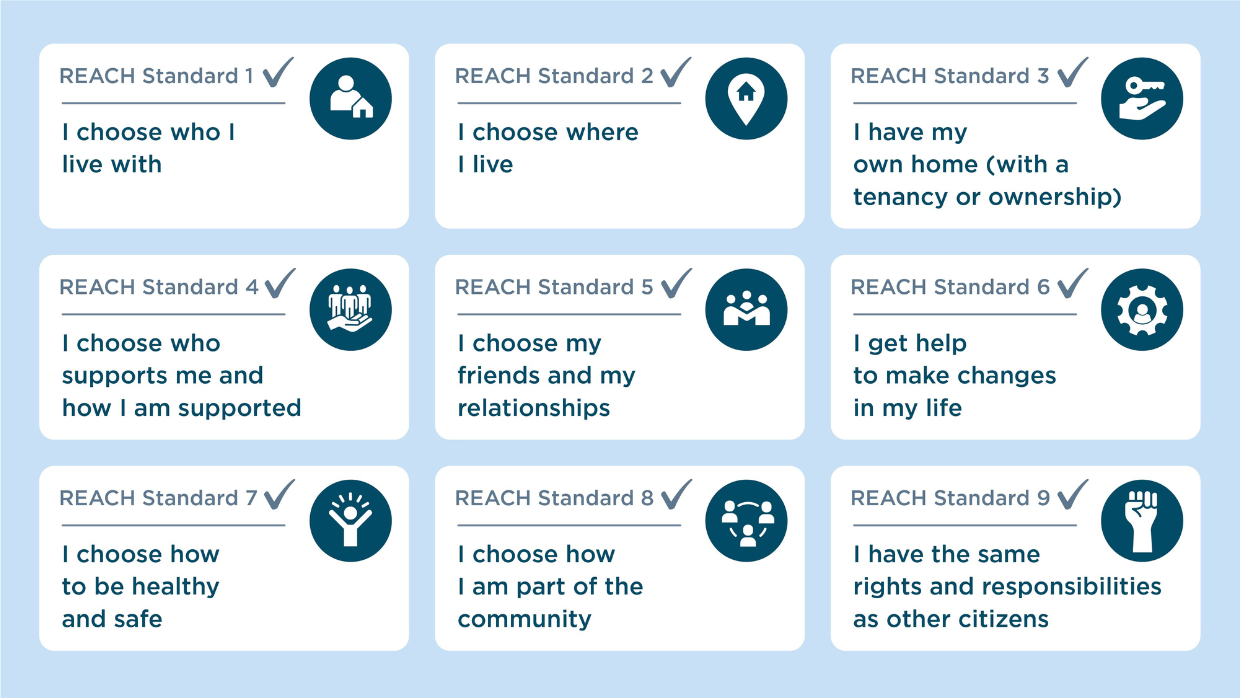Supported living services
Learn about Priory’s supported living services and the care and support we provide.
Priory provides a range of supported living services for adults who have care and support needs. This includes people who are autistic, have a learning disability or a mental health condition. Our supported living services enable people to live active lives, independently and safely in their local communities.
Supported living, sometimes known as assisted living, is a way to help people live as independently as they can. When a person enters supported living, they have their own home with their own tenancy agreement. At the same time, they receive the support and care they need.
Our specialist support enables people to live happy and fulfilling lives in their own homes, with their own tenancies. Supported living offers people greater choice and control over how they live their lives.
Supported living services help adults with a wide range of conditions, presentations and support needs. This includes people who are on the autism spectrum, have a learning disability or mental health condition. We can also support people who have a brain injury, physical health conditions, or complex needs. Our expert teams will tailor the care and support we provide to the specific requirements of each person.
I love it here
I have started making positive plans for the future and, with staff support, I have applied for a job. This is the best placement for me so far in my life and I love it here.
All our tenants’ homes are comfortable and modern. In addition, many homes have assistive technology services to maximise independence for the people who live there.
There are different types of supported living, with options to live alone or share with others. This includes self-contained apartments and bungalows as well as communal living options. We are also able to offer completely bespoke solutions, with accommodation adapted to meet individual needs.
By understanding what each person wants and needs, we can decide on the best type of housing and where it should be. We can provide help with tenancy agreements, giving people the security of their own homes. If a person wishes to live with other people, we match them with people who have shared interests and lifestyles.
We focus on each person's individual needs, preferences and goals when providing support and care. We take a person-centred approach, embedding the Reach Standards across our services. Our aim is to empower people to make their own choices about how they live their lives.
We also create tailored care pathways from our independent hospitals and residential care settings. We know the move to supported living can be a significant change, which is why we carefully plan each transition. This ensures that the transition to our services is a smooth and positive experience for each new tenant.
Priory is passionate about providing our supported living service tenants with as much independence as possible, enabling them to live a life of their choice, supported by Priory every step of the way.
To demonstrate this, our practices reflect the guidance of The Reach Standards across our supported living services. The Reach Standards are a set of nine voluntary standards created by Paradigm, to ensure people are supported to live the life they choose – with the same choices, rights and responsibilities as other citizens. These standards ensure our focus remains on continually delivering a high level of quality support, and that there's ongoing dialogue with our tenants in consideration of this.
The Reach Standards are recommended by health and social care regulators, and are the most widely recognised standards across the UK in relation to supported living. These standards are even fed into our central records system, Nourish, to ensure discussions with tenants take place and are recorded to enable us to monitor and review progress.

Supported living is an arrangement whereby a person receives a package of care and support to enable them to live in their own home. These services help people to live happy and fulfilling lives and achieve the things they want to achieve.
Someone in supported living will have their own home and tenancy agreement. They will be responsible for the cost of living and paying their bills, with support from staff. This means that supported living can offer greater autonomy and personal space. Someone in residential care will not have these responsibilities.
You may be eligible for supported living if you are above the age of 18, and need support to live independently. Priory supports adults with a range of conditions, presentations and needs, such as:
Supported living is a service that enables people to maintain their independence in their own homes. Everyone in supported living has their own tenancy, and they manage their own bills and daily expenses. This makes supported living a good way to blend assistance with self-reliance.
Support is available from a few hours a week to 24 hours a day, 7 days a week, including on a one-to-one basis. We provide care and support across a range of areas. These include:
Priory has established partnerships with housing providers across the UK, offering a variety of supported living accommodation options. The types of housing we offer include:
By understanding each person’s needs and goals, we can agree the type of accommodation and locations that might work best for them.
All of our tenants’ homes are comfortable and modern. Many have assistive technology services to support daily living. Their convenient locations provide easy access to amenities and transport links. Some types of supported living accommodation are entirely self-contained, while others share communal facilities with other tenants.
The landlord or housing provider will make repairs to the home. In the event of deliberate damage, it's the responsibility of the tenant to fund any repairs. Details of this will be included within their tenancy agreement.
Friends and family are welcome to visit at any time.
The properties generally come unfurnished, and we can support people to pick out their furniture. We also encourage tenants to personalise their spaces to their tastes, in accordance with their tenancy agreement.
The Care Quality Commission (CQC), the Care Inspectorate Wales (CIW) and the Care Inspectorate (CI) in Scotland regulate our supported living services. Our own internal quality teams also oversee our schemes. This ensures a robust and responsive approach, which means that we can support people in the best possible way.
As tenants, the people living in a supported living service pay for their own accommodation. They may fund this via housing benefits in the form of rent payments to the housing provider.
You will pay for the support services provided by the care provider separately. Funding options include direct payments, or funding from your local authority or the NHS. The fees may vary, and we base them on an assessment of each person's needs.
Please visit our funding and referrals page to learn more about how you can fund our services.
With our support and where possible, tenants pay for their day-to-day living expenses, such as food and clothing. Tenants are responsible for paying bills and any additional outgoings they may have, such as contents insurance, internet access and a TV license.
Those eligible for funding should contact their local authority. Please visit our funding and referrals page to learn more about how you can access support.
Priory provides supported living services in many region across the UK. To learn more, take a look at our regional services below.

Angela Dyson is Priory's supported living director. She has a wealth of experience in the social care industry, working with adults with complex needs. This includes over 30 years as a qualified social worker, and working in both the statutory and voluntary sectors within operational management. Before taking on her current role, she worked for 10 years as an integrated commissioner for mental health and disability, within a local authority.
If you have any questions or need further information about funding, referrals or our supported living services, please don’t hesitate to get in touch with us.